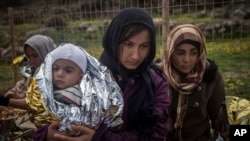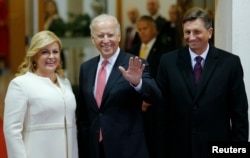Southeast and central European leaders have pledged closer cooperation on combating terrorism and dealing with the regional refugee crisis that has overwhelmed the European Union.
The pledge was made Wednesday in the Croatian capital, Zagreb, at an annual summit also attended by U.S. Vice President Joe Biden and the president of the European Council, Donald Tusk.
A declaration issued after the summit said the migrant crisis poses an "unprecedented" humanitarian and security challenge, "requiring dialogue and agreement to better protect the EU's external borders."
The wave of refugees fleeing unrest in the Middle East and North Africa has become a source of tension among the countries on the migrant corridor - Greece, Macedonia, Serbia, Croatia and Slovenia. It has also presented a major political and security challenge for those countries.
"The refugee crisis is straining the resources of the countries in the region,'' Biden said. "It is clear there is a need to improve cross-border cooperation, information sharing to deal with the flow of refugees, while stepping up the capability to counter the terrorist threats as well.''
Biden’s visit comes while the debate in Washington about whether to admit Syrian refugees has intensified, following a series of attacks in Paris claimed by the Islamic State group that left 130 dead and hundreds wounded.
At least two of the militants involved in the November 13 Paris attacks had passed through Greece, apparently posing as asylum-seekers.
Wednesday's summit also focused on the European Union accession process for candidate members in the Balkan region – Albania, Macedonia, Montenegro and Serbia.
Biden said it is important that the entire region eventually be integrated within the EU. "It is the ultimate guarantee that there would be a Europe [that is] whole, free, and at peace," he said.
Also in attendance at the summit are the leaders of Albania, Bosnia and Herzegovina, Kosovo, Macedonia and Serbia.
The annual gathering, held regularly since 2013, brings together presidents of all the countries of the region to promote cooperation and European integration.
The summits are usually hosted by Slovenia or Croatia, the only two Balkan countries that are members of the European Union.






